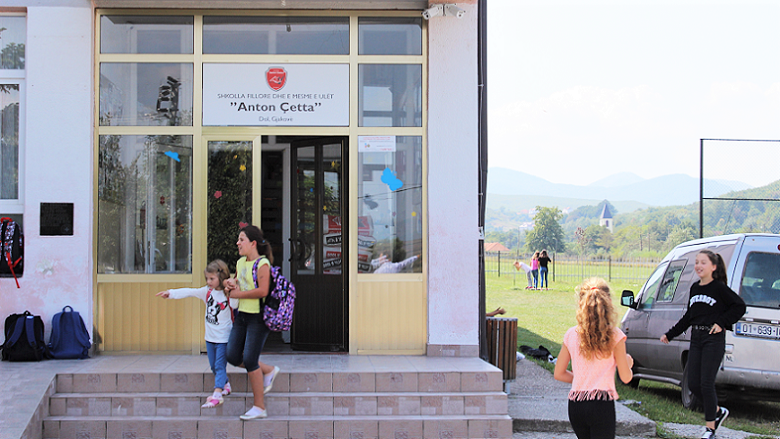Challenge
In Kosovo, few households, businesses, or institutions have access to high-speed broadband Internet, which hinders efficient public service delivery, skills acquisition, and online employment. Many schools lack access to broadband and instead rely on low-speed Internet connections or else remain unconnected.
Universities and colleges are also poorly connected, making knowledge exchange or international research collaboration almost impossible. Many health centers are without high-speed connectivity, impeding the provision of medical services in rural and isolated areas, while mobile broadband services remain undeveloped.
Villages like Breznica, north of Pristina, struggle to connect with the rest of the world because rough terrain and loose population density mean Internet services cannot provide good enough connectivity on commercial basis.
Approach
The World Bank is helping Kosovo develop its digital infrastructure through the Digital Balkans programmatic Advisory Services and Analytics (ASA). The objective is to expand and strengthen hard and soft digital infrastructure at the national and regional levels.
The World Bank assisted Kosovo’s Ministry of Economic Development in conducting studies to better understand the country’s broadband infrastructure from technological, financial, and business sustainability perspectives. The Bank also supported the ministry in devising the KODE project.
The ministry implemented several pilot projects to install broadband connections in rural areas across Kosovo. The private sector was incentivized by public co-investment to deploy a high-speed network allowing access to each household in pilot locations. The open competition ensured that the Internet provider offering the lowest price and requesting the lowest amount of matching government funds was chosen to implement the pilot.
Results
- The Government of Kosovo allocated funds from the national budget and implemented a pilot initiative in which the inhabitants of 10 villages across Kosovo—891 households—were connected to high-speed Internet in 2018, at prices similar to those in Pristina and other larger Kosovar cities.
- Four schools and three health facilities, in selected villages, have been given free access to high-speed Internet for the next five years.
- Participating municipalities welcomed the Government’s initiative by granting construction permits more quickly.
- Additional pilot projects are being prepared that will enable a total of 34 villages, with over 2,400 households, 22 schools and 14 health institutions, to connect to high-speed Internet.
- One of the pilot projects connected 213 households in the villages of Pjetershtan, Dol, and Kusar in the Gjakova Municipality in western Kosovo, as well as their schools, which have more than 200 pupils. 94 percent of families in these locations have subscribed to the broadband services. Strong adoption of high-speed broadband services among households is also observed in other pilot locations.
- The expansion of high-speed Internet into rural areas will continue. On July 5, 2018, the World Bank’s Board of Executive Directors approved the KODE project to further increase access to better high-speed broadband services and online knowledge sources, services, and labor markets for the people of Kosovo. The project will cover 100 percent of uncovered areas of the country, bringing equal digital opportunities to institutions, companies, and people living there.
World Bank Group Contribution
The Digital Balkans programmatic ASA ($296,669) provides a conceptual umbrella for ongoing and new activities on digital development opportunities in the Western Balkans. The objective was to identify and prioritize investment activities for the Ministry of Economic Development that promote digital businesses and continue an earlier dialogue on the rollout of broadband Internet in rural areas and general digital skills development.
The Bank provided critical advice to the ministry, advised on designs, and prepared a cost-benefit analysis of prospective broadband infrastructure investments. The recently approved KODE project is supported by an International Development Association (IDA) credit of €20,700,000 ($25 million equivalent); and financing has a maturity of 25 years, including a five-year grace period.
Partners
The European Commission, through its Technical Assistance and Information Exchange instrument, contributed by providing funding for the Ministry of Economic Development and the Ministry of Finance to travel to Finland to learn about the most effective ways to expand digital infrastructure into rural areas.
Moving Forward
With Bank support, the pilot projects to expand broadband connections into rural areas will be scaled-up, providing access for most of rural Kosovo to high-speed Internet in five years. Under the KODE project, more than 200 villages, or near all uncovered settlements in Kosovo, will obtain high-speed broadband by 2023, with schools and hospitals connecting free of charge for five years. Over 60,000 rural inhabitants will benefit from this project.
More Kosovars will gain digital knowledge, information, and services through the National Research and Education Network and a Digital Awareness Program that specifically targets households in areas where fixed broadband connectivity will be available for the first time through the project. Colleges and universities will get a major boost by linking to GÉANT, a network that connects Europe’s national research and education networking organizations via highly resilient, pan-European broadband.
The project will also establish a Youth Online and Upward Program, which aims to train 2,000 young men and women in front-end web development, graphic design, and search engine optimization. It is expected that, with modest investment in training, unemployed and underemployed youth—many from rural areas—could earn money through online freelancing activities and even obtain full-time jobs for the first time.
Beneficiaries

“I could not believe it when they told me, ‘we will give you free cable Internet,’ but it is true,” says Gjovalin Loshi, a medical technician at a health facility in the village of Pjetershtan (western Kosovo) who uses the Internet to communicate with patients and colleagues at a nearby health center.

